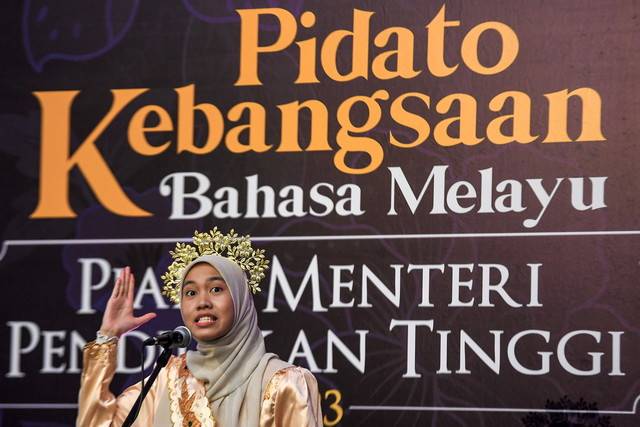Malay language proficiency among some Malaysians still low - Experts

KUALA LUMPUR - The Madani Government’s policy of making it compulsory for official letters involving the administration and its agencies to be written in Malay reflects its commitment to dignifying the national language in the country, experts said.
They said that it came as no surprise when Prime Minister Datuk Seri Anwar Ibrahim last October instructed government agencies to return correspondence written in any language other than Malay in a move to uphold the national language.
Anwar had in the past called on Malaysians to focus on enhancing the quality and level of proficiency in Malay as a language of knowledge.
The Bahasa Melayu issue resurfaced following a recent incident on the alleged mistreatment of a woman and her daughter at a Johor immigration counter due to her inability to speak Malay when renewing her daughter’s passport.
To gain further insights into the issue, Bernama recently conducted a random survey at several government agencies dealing with members of the public, and it was found that the language proficiency is a matter of concern.
It is learnt that the language constraints are some of the daily issues faced by staff at counters of government agencies. There are also cases when third-party assistance is required as interpreters.
Besides that, the use of English language in official correspondence is still prevalent despite the Madani government’s directive that all official letters should be written in Malay.
"However, to accommodate all quarters, we still entertain them,” said an officer at an agency when asked by Bernama for confirmation.
ASHAMED TO SPEAK MALAY?
Senior Research Fellow at the Institute of Ethnic Studies (KITA), Universiti Kebangsaan Malaysia Assoc Prof Dr Zaini Othman cited "kurang rasa cinta” (less patriotic) and "semangat kekitaan” (esprit de corps) as among the key factors as to why the Malay language competency issue still exists, especially among non-native speakers.
He pointed out that as a nation which has achieved independence for almost 67 years, with the Federal Constitution clearly stipulating Bahasa Melayu as the national language through Article 152 (clause 1), the Malay language proficiency should not arise.
"This is related to the existence of a sovereign nation, and the sovereign identity of the nation means that it is not merely symbolic or rhetoric, but an element of thrust in recognising an individual as a citizen of a country,” he said.
Although Article 152 does not prohibit the use of other languages, it should not be used as an excuse to sideline the Malay language.
According to Zaini, based on his observation, non-native speakers do not have problems in the Malay language in terms of writing based on the national main examination results in public schools.
"We found that many non-bumiputera students passed with flying colours in their written Malay tests.
"This is indeed unfortunate as we are too focused on academic achievements while all these are only cosmetic in nature, it only looks good on paper,” he said.
He however does not dispute the fact that there are members of the community including Malays themselves who are reluctant to use their mother tongue in their social engagement as they regard the Malay language as an inferior language.
"Lest they forget, the Malay language has a long history and was once world renowned as the lingua franca among international traders. We should be proud that there are many words in other languages that are borrowed from Malay. For example, amok (amuk), paddy (padi), bamboo (bamboo) and many others in English, which shows the Malay language is rich in vocabulary.
"What’s mind boggling is, if we can learn other languages while travelling abroad, why can’t we use our own language in our country? We should be proud to embrace our own language given that ‘Language is the Soul of the Nation’, he said.
Zaini described Malaysians who are still ashamed or lack the confidence in using the Malay language in their daily conversation as "a tragedy for the nation and its people.”
"As such, a mental revolution to dignify the Malay language is needed by all quarters,” he said, hoping that the current government’s initiative is not half-hearted.
"HALIMUNAN WALL”
Concurring with the view that there are Malaysians who are ashamed to speak in Malay in their daily lives or in a formal environment, Director-General of Dewan Bahasa dan Pustaka (DBP) Dr Hazami Jahari cited the socialising factor as an obstacle.
He said based on observation from DBP as a body responsible for coordinating the use of the Malay language and Malay literature in the country, there is a "halimunan wall” (invisible wall) that limits the social interaction among the races, either at the workplace or in schools.
"It appears that while they are physically present at the same place, there is a wall in their social interaction,” he told Bernama in an interview.
As such, he said, the Malay language is only limited to native speakers while others interact in their respective mother tongue.
"Besides that, the social gap is also due to physical factors. For example, if an employee only speaks Malay in the office, he does not put it into practice when he returns home. The national language will also not be spoken especially in areas that are scarcely populated by Malays,” he said.
As such, he proposed that the Malay language be embraced at the early stage, especially in national-type schools.
"If we look at vernacular schools, Bahasa Melayu is only used during a session on strengthening the Malay language. Besides that, it is not in their syllabus. It would be good if these schools can consider using the Malay language as a core subject such as History,” he said.
Hazami believes that if communication skills in Malay are cultivated since young, it would not be impossible for the nation to produce future generations who are proud of the national language.
"Another barrier to the culturisation of the Malay language among non-bumiputeras is their attitude and lack of confidence in using the language. There are some who regard the language as unsuitable for use in business and trade matters.
"On the contrary, other developed nations such as Japan, South Korea and China had taken a bold step in using their own language as a language for commerce, (and) there’s no problem for them to emerge as among the world’s economic powerhouses,” he said.
Hazami also opined that efforts to boost the economic value of a language would depend on the people’s willingness to elevate their national language to a business lingua franca.
"In actual fact, if we regard ourselves as true citizens, the race issue should not stop us from communicating in Malay even among our own race. This is what we call high patriotic spirit and this attitude should be nurtured at a young age,” he added.
LEVERAGE ALL PLATFORMS
To strengthen the Malay language, Hazami urged the government to empower the language in all sectors and not merely focused on the public sector.
"The mass media should play their role by inculcating a love for Bahasa Melayu and dignifying the Malay language. For example, radio and television can embark on campaigns to instil love for the language and proper use of Malay in their programmes.
"But sadly, some programmes including dramas and films today tend to mix up the Malay language and are not using proper Malay. This is actually wrong and should be immediately rectified,” he said.
On the part of DBP, he said the organisation has set up the Akademi DBP to formulate strategies and procedures for implementing lifelong education, especially in conducting Malay language, literature and publication courses.
As such, through the various courses offered, DBP can enhance Malay language proficiency among the public or participants in particular, he said.
In addition, JendelaDBP which can be accessed by the public in 147 nations is among the efforts to internationalise the Malay language and to promote free DBP services. Other services include Pusat Rujukan Persuratan Melayu, DBP published books and digital magazines covering 11 DBP publications.
Meanwhile, Zaini also urged local authorities (PBTs) to be firm in implementing the national language policy by ensuring that only Malay is used on every signboard and billboard.
"PBTs should maintain their integrity and serve as the government’s ‘right hand’ in upholding the dignity of the Malay language and prevent it from being spoilt through mix-up of languages especially by companies through their advertisements,” he said.
SELF-MOTIVATION
Meanwhile, Head of Social, Law and Human Rights at EMIR Research, Jason Loh Seong Wei said he is proud to be able to speak fluent Malay.
"Although I’m Chinese, I am fond of speaking in Malay but not as fluent as Human Resource Minister, Steven Sim who is known for his talent in reciting Nusantara-themed pantun (Malay poem).
"For me, the Malay language is a form of art that allows you to coherently express your thoughts freely without limitations by virtue of its characteristics that are open to external influences (such as Arabic and English) and with its own unique rhythm (that is not tied to only one form),” he said.
He also brushed aside arguments that the Malay language is difficult to learn.
"There are those who said that the Malay language is difficult to master. This is not true. On the contrary, the language is simple to learn and can easily be practised especially as a medium of everyday communication,” he said.
He also shared his own experience when he lost his grasp of the Malay language - both spoken and written - after returning from his studies in the United Kingdom in 2003.
"I was sad at first, but decided to motivate myself in regaining my skills in the Malay language. My current job responsibilities and my professional work demands as a researcher at a think-tank have taken me to a high level; my language proficiency has improved by leaps and bounds since then.
"I am also excited to speak in Malay whenever I get the chance of being interviewed or while attending official events, so that I can articulate the Malay language on matters related to policies, especially involving the Malay community,” he added.
He also said that his ability to share his thoughts and insights on issues and policies in Bahasa Melayu provided him with the opportunity to deliver the information more effectively to target groups, hence directly benefitting every level of the Malaysian community. - BERNAMA
Download Sinar Daily application.Click Here!














